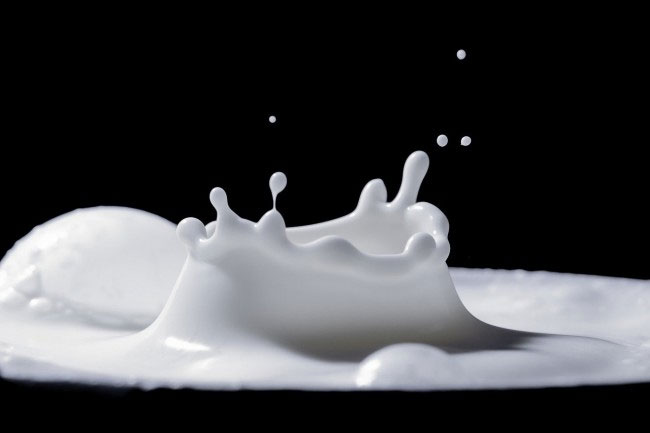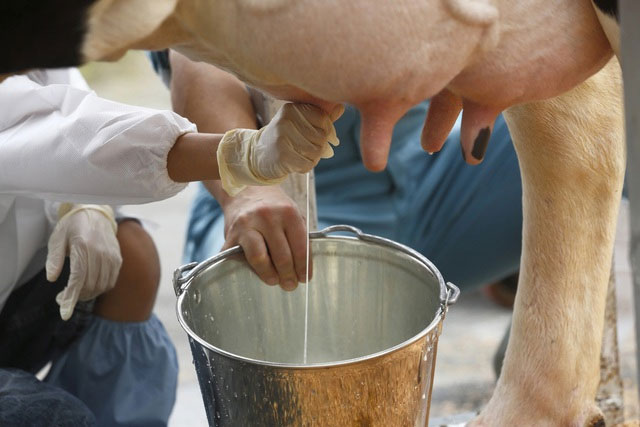Synthetic Milk Could Cause the Dairy Industry to Collapse.
1. What is Synthetic Milk?
No cows are needed to produce milk. Unlike synthetic meat, which struggles to replicate the complexity and texture of animal meat, synthetic milk is marketed as having the taste, appearance, and feel of regular cow’s milk.
The global dairy industry is undergoing a transformation. Synthetic milk is emerging as a new trend, competing with animal-based food products.
Synthetic milk does not require cows or any other animals. This type of milk has a biochemical composition similar to animal milk, but it is produced using a new biotechnology technique known as “precision fermentation.” This process generates biomass cultivated from cells.

Synthetic milk is not a futuristic concept; it has existed for quite some time.
Over 80% of the world’s population regularly consumes dairy products. There is a growing call to shift from animal-based food systems to more sustainable forms of production.
Synthetic milk is becoming a promising option for providing consumers with milk without the concerns associated with methane emissions or animal welfare.
However, this new product must overcome numerous challenges and pitfalls to become a fair, sustainable, and viable alternative to animal-derived milk.
Synthetic milk is not a futuristic concept; it has existed for quite some time. For instance, in the United States, the company Perfect Day has been providing animal-free protein created from microorganisms, used to make ice cream, protein powder, and milk.
In Australia, the startup Eden Brew is developing synthetic milk in Werribee, Victoria. The company is targeting consumers who are increasingly concerned about climate change, particularly the emissions from dairy farming.
The Commonwealth Scientific and Industrial Research Organisation (CSIRO) of Australia has developed the technology behind Eden Brew’s product. The process begins with yeast and uses “precision fermentation” to create proteins similar to those found in cow’s milk.
CSIRO states that these proteins provide the milk with various properties and contribute to its creamy texture and foaming ability. Minerals, sugars, fats, and flavors are added to create the final product.
Also in Australia, All G Foods has raised $17.4 million this month to accelerate the production of synthetic milk. Within seven years, the company aims to make its synthetic milk cheaper than cow’s milk.
Is Cow’s Milk Becoming Obsolete?
If the synthetic milk industry can achieve widespread cost targets, the likelihood of the dairy industry collapsing is very high. This also leads to the prospect of humanity moving away from traditional livestock farming toward entirely different food systems.

Will cow’s milk become obsolete with the rise of synthetic milk?
A 2019 report on the future of the dairy industry indicated that by 2030, the precision fermentation industry in the U.S. could create at least 700,000 jobs.
If synthetic milk can replace milk as an ingredient in the industrial food processing sector, this could pose significant challenges for companies producing milk powder for the ingredient market.
Some traditional dairy companies are jumping into the race. For example, the Australian dairy cooperative Norco is supporting the Eden Brew project, and the New Zealand dairy cooperative Fonterra announced a joint venture last week to develop and commercialize “fermentation-derived protein with milk-like properties.”
Before synthetic milk becomes a major threat to animal-derived milk, the industry will require significant capital and investment in research and development, as well as new production infrastructure such as fermentation tanks and bioreactors.
It is certain that traditional dairy farming will not disappear overnight.
Synthetic milk is not a perfect product. Although this technology has immense potential for environmental benefits and animal welfare, it comes with challenges and potential downsides, including product output quality.
Moreover, the rise of synthetic milk could trigger a global labor crisis in the dairy sector. For instance, if traditional dairy cooperatives in Australia and New Zealand switch to producing synthetic milk, dairy farmers could face unemployment.
Additionally, rising prices of synthetic milk in the coming years could disrupt the current food system.


















































